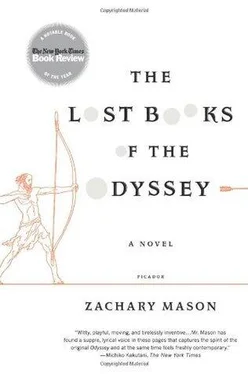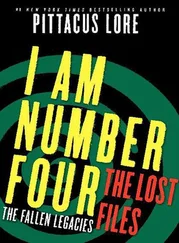Zachary Mason
The Lost Books of the Odyssey
Despite its complexity, a handful of images are central to the Odyssey —black ships drawn up on a white beach, a cannibal ogre guarding a cave mouth, a man searching a trackless sea for a home that forgot him. Nearly three millennia ago a particular ordering of these images crystallized into the Odyssey as we know it, but before that the Homeric material was formless, fluid, its elements shuffled into new narratives like cards in a deck. Echoes of the other Odyssey s survive in Hellenistic friezes, on Cycladic funerary urns, and in a pre-Ptolemaic papyrus excavated from the desiccated rubbish mounds of Oxyrhynchus; this last contains forty-four concise variations on Odysseus’s story that omit stock epic formulae in favor of honing a single trope or image down to an extreme of clarity. I hope that this translation reflects the haunted light of Homer’s older islands, where the familiar characters are arranged in new tableaux, but soon become restless, mercurial — they turn their backs, forget their names, move on.
THE LOST BOOKS OF THE ODYSSEY
Odysseus comes back to Ithaca in a little boat on a clear day. The familiarity of the east face of the island seems absurd — bemused, he runs a tricky rip current he has not thought about in fifteen years and lands by the mouth of a creek where he swam as a boy. All his impatience leaves him and he sits under an oak he remembers whose branches overhang the water, good for diving. Twenty years have gone by, he reflects, what are a few more minutes. An hour passes in silence and it occurs to him that he is tired and might as well go home, so he picks up his sword and walks toward his house, sure that whatever obstacles await will be minor compared to what he has been through.
The house looks much as it did when he left. He notices that the sheep byre’s gate has been mended. A rivulet of smoke rises from the chimney. He steals lightly in, hand on sword, thinking how ridiculous it would be to come so far and lose everything in a moment of carelessness.
Within, Penelope is at her loom and an old man drowses by the fire. Odysseus stands in the doorway for a while before Penelope notices him and shrieks, dropping her shuttle and before she draws another breath running and embracing him, kissing him and wetting his cheeks with her tears. Welcome home, she says into his chest.
The man by the fire stands up looking possessive and pitifully concerned and in an intuitive flash Odysseus knows that this is her husband. The idea is absurd — the man is soft, grey and heavy, no hero and never was one, would not have lasted an hour in the blinding glare before the walls of Troy. He looks at Penelope to confirm his guess and notices how she has aged — her hips wider, her hair more grey than not, the skin around her eyes traced with fine wrinkles. Without the eyes of homecoming there is only an echo of her beauty. She steps back from him and traces a deep scar on his shoulder and her wonder and the old man’s fear become a mirror — he realizes that with his blackened skin, tangled beard and body lean and hard from years of war he looks like a reaver, a revenant, a wolf of the sea.
Willfully composed, Penelope puts her hand on his shoulder and says that he is most welcome in his hall. Then her face collapses into tears and she says she did not think he was coming back, had been told he was dead these last eight years, had given up a long time ago, had waited as long as she could, longer than anyone thought was right.
He had spent the days of his exile imagining different homecoming scenarios but it had never occurred to him that she would just give up. The town deserted, his house overrun by violent suitors, Penelope dying, or dead and burned, but not this. “Such a long trip,” he thinks, “and so many places I could have stayed along the way.”
Then, mercifully, revelation comes. He realizes that this is not Penelope. This is not his hall. This is not Ithaca — what he sees before him is a vengeful illusion, the deception of some malevolent god. The real Ithaca is elsewhere, somewhere on the sea-roads, hidden. Giddy, Odysseus turns and flees the tormenting shadows.
In the Imperial Court of Agamemnon, the serene, the lofty, the disingenuous, the elect of every corner of the empire, there were three viziers, ten consuls, twenty generals, thirty admirals, fifty hierophants, a hundred assassins, eight hundred administrators of the second degree, two thousand administrators of the third and clerks, soldiers, courtesans, scholars, painters, musicians, beggars, larcenists, arsonists, stranglers, sycophants and hangers-on of no particular description beyond all number, all poised to do the bright, the serene, the etc. emperor’s will. It so happened that in the twentieth year of his reign Agamemnon’s noble brow clouded at the thought of a certain Odysseus, whom he felt was much too much renowned for cleverness, when both cleverness and renown he preferred to reserve for the throne. While it was true that this Odysseus had made certain contributions to a recent campaign, involving the feigned offering of a horse which had facilitated stealthy entry into an enemy city, this did not justify the infringement on the royal prerogatives, and in any case, the war had long since been brought to a satisfactory conclusion, so Agamemnon called for the clerk of Suicides, Temple Offerings, Investitures, Bankruptcy and Humane and Just Liquidation, and signed Odysseus’s death warrant.
The clerk of Suicides etc. bowed and with due formality passed the document to the General who Holds Death in His Right Hand, who annotated it, stamped it, and passed it to the Viceroy of Domestic Matters Involving Mortality and so on through the many twists and turns of the bureaucracy, through the hands of spy-masters, career criminals, blind assassins, mendacious clerics and finally to the lower ranks of advisors who had been promoted to responsibility for their dedication and competence (rare qualities given their low wages and the contempt with which they were treated by their well-connected or nobly born superiors), one of whom noted it was a death order of high priority and without reading it assigned it to that master of battle and frequent servant of the throne, Odysseus.
A messenger came to Ithaca and gave Odysseus his orders. Odysseus read them, his face closed, and thanked the messenger, commenting that the intended victim was in for a surprise, and that he was morally certain no problems would arise on his end.
On the eight succeeding days Odysseus sent the following messages to the court as protocol required:
“I am within a day’s sail of his island.”
“I walk among people who know him and his habits.”
“I am within ten miles of his house.”
“Five miles.”
“One.”
“I am at his gate.”
“The full moon is reflected in the silver mirror over his bed. The silence is perfect but for his breathing.”
“I am standing over his bed holding a razor flecked with his blood. Before the cut he looked into my face and swore to slay the man who ordered his death. I think that as a whispering shade he will do no harm.”
I should have dreamed that night, of choking up a white bird that fought free of my throat, shook itself and flew away, leaving me empty and retching. But in fact there was no warning and I had no dreams, waking before dawn to a morning like every other morning on the long shore of Troy, alone in my tent — the smell of wood smoke, the light of false dawn, the silhouettes of passing soldiers on the canvas wall.
Читать дальше












